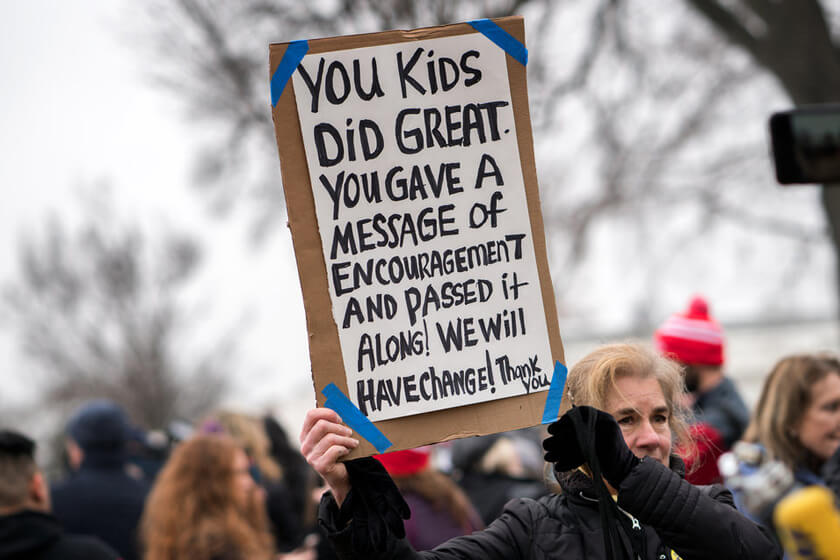West Long Branch, NJ – The vast majority of Americans support comprehensive background checks and a national registry for gun purchases. But there is a stark difference of opinion among gun owners on these policies depending on their affiliation with the National Rifle Association. NRA members are particularly worried that a national gun registry would be used to monitor other activities. The Monmouth University Poll also finds that the students involved in last month’s school shooting are seen as effective gun control advocates who are handling themselves well in front of the TV cameras.
The vast majority (83%) of Americans support requiring comprehensive background checks for all gun purchasers including private sales between two individuals. This includes 68% who strongly support this and 15% who somewhat support it. Backing for this proposal comes from 91% of Democrats, 83% of independents, and 72% of Republicans. There is also widespread support (65%) for establishing a national gun ownership database to register all guns in the country, with over half (52%) of the public strongly supporting this and 13% somewhat supporting it. Majorities of Democrats (84%) and independents (64%) back this proposal, while Republicans (45%) are more lukewarm.
Women are somewhat more likely than men to support background checks (89% to 77%) and considerably more likely to support a national gun registry (77% to 52%). This gender gap holds across all partisan groups but is much less pronounced among Republicans.
The poll also finds a difference of opinion on these measures among gun owners based on membership in the National Rifle Association. Among NRA members, 69% support comprehensive background checks. Slightly, but not significantly, more gun owners who are not NRA members support required background checks for all firearms purchasers (78%). Nearly 9-in-10 non-gun owners (89%) back this. Differences of opinion among gun owners are more stark when it comes to establishing a national gun registry database. Only 31% of NRA members support such a registry – in fact 57% strongly oppose it. However, a majority (52%) of gun owners not affiliated with the NRA actually back this proposal. More than 3-in-4 non-gun owners (79%) also support establishing such a database.
“There is widespread public support for background checks and even establishing a national gun registry. This includes most gun owners, unless they are affiliated with the NRA,” said Patrick Murray, director of the independent Monmouth University Polling Institute.
Just over half of the public (51%) expresses concern that these proposed registration measures would be used by the federal government to monitor other activities of American citizens, including 24% who are very worried about this possibility and 27% are somewhat worried. Just under half are not too worried (25%) or not at all worried (23%). NRA members (79%) are significantly more likely than other gun owners (55%) and non-gun owners (44%) to express at least some worry that the government would use background checks or a gun database to track Americans’ activities.
The public as a whole is divided on whether they trust Donald Trump to do the right thing on gun policy – 46% trust him and 49% do not. The president has sent out conflicting messages about what gun measures he supports. Despite this, NRA members are confident that Trump will do what they consider to be the “right thing,” with an overwhelming 86% saying they trust the president on gun policy. Just over half (55%) of other gun owners and only 35% of non-gun owners say they trust Trump when it comes to how he will act on gun policy.
“Trump has been sending out all sorts of mixed signals on guns recently, but NRA members seem to be very confident that he will side with them in the end, and non-gun owners think they are probably right,” said Murray.
The gun debate seems to have taken on a new impetus after the mass shooting in Parkland, Florida last month, particularly given the media presence of students from the school involved in that violence. Most of the public (62%) feels that the Parkland students are effective advocates for gun control compared to just 29% who say they are not effective. A majority (57%) of the public feels that these students are having more impact on the gun debate than past victims of mass shootings had. Just 5% say they have had less impact and 35% say they have had about the same amount of impact as other victims.
The public is more likely to see these students as advocating for issues they really believe in (47%) than to see these students as being manipulated by outside groups (22%). Another 27% say that the Parkland students are advocating for their beliefs but are also being manipulated at the same time. Nearly two-thirds (64%) approve of how these students are handling themselves in the media while just 22% disapprove. Fully 7-in-10 (70%) report having seen the Parkland students interviewed on TV.
NRA members tend to hold negative views of these teenagers, though – 65% say the Parkland students are not effective advocates, 50% disapprove of how they are handling themselves in the media, and 61% believe they are being manipulated by outside groups rather than expressing their own beliefs. Other gun owners are somewhat more positive – 48% say the Parkland students are effective advocates, 53% approve of how they are handling themselves in the media, and a plurality of 40% say they are talking about issues they really believe in.
“There is a sense among the American public that the gun debate is somehow different this time, in large part because of the Parkland students’ advocacy. However, there is still a stark political divide driven by special interests who represent about one-third of gun owners. The NRA’s influence in Washington may still be powerful enough to maintain the status quo on national gun policy,” said Murray.
According to the poll, about one-third of American adults (34%) report currently owning a firearm. And 30% of these gun owners report living in an NRA household while 70% are not currently affiliated with the NRA. Politically, nearly two-thirds (65%) of NRA members align themselves with the Republican Party, 32% are independents, and just 2% are Democrats. There is much more partisan diversity among gun owners who are not NRA members – 44% independent, 32% Republican, and 25% Democrat.
Gun owners have a variety of reasons why they own firearms, with the top major ones being for personal safety against an attacker (68%) and to protect their property (61%). About half say hunting (48%) and target practice (47%) are major reasons why they own a gun. Fewer report collecting guns as a hobby (27%) or needing a gun for their job (11%) as major reasons they own a firearm. About 1-in-4 gun owners (23%) also say that defending against possible government tyranny is a major reason why they own a gun. Other than owning a gun for work, NRA members are more likely than others to report that all of these motivations are major reasons why they personally own a gun.
The Monmouth University Poll was conducted by telephone from March 2 to 5, 2018 with 803 adults in the United States. The results in this release have a margin of error of +/- 3.5 percent. The poll was conducted by the Monmouth University Polling Institute in West Long Branch, NJ.
QUESTIONS AND RESULTS
(* Some columns may not add to 100% due to rounding.)
[Q1-19 previously released.]
20. Do you support or oppose requiring comprehensive background checks for all gun purchasers, including private sales between two individuals? [Do you support/oppose that strongly or somewhat?]
| March 2018 | |
| Strongly support | 68% |
| Somewhat support | 15% |
| Somewhat oppose | 5% |
| Strongly oppose | 11% |
| (VOL) Don’t know | 2% |
| (n) | (803) |
21. Do you support or oppose establishing a national gun ownership database to register all guns in the country? [Do you support/oppose that strongly or somewhat?]
| March 2018 | |
| Strongly support | 52% |
| Somewhat support | 13% |
| Somewhat oppose | 7% |
| Strongly oppose | 25% |
| (VOL) Don’t know | 3% |
| (n) | (803) |
22. How worried are you that something like comprehensive background checks or a national gun ownership database would be used by the federal government to monitor other activities of American citizens – very worried, somewhat worried, not too worried, or not at all worried?
| March 2018 | |
| Very worried | 24% |
| Somewhat worried | 27% |
| Not too worried | 25% |
| Not at all worried | 23% |
| (VOL) Don’t know | 1% |
| (n) | (803) |
23. Do you trust or not trust President Trump to do the right thing on gun policy? [If TRUST: Do you trust him a lot or a little?]
| March 2018 | |
| Trust a lot | 29% |
| Trust a little | 17% |
| Do not trust | 49% |
| (VOL) Don’t know | 4% |
| (n) | (803) |
24. Have you seen any of the students involved in the Parkland, Florida high school shooting being interviewed on TV, or not?
| March 2018 | |
| Have seen | 70% |
| Not seen | 30% |
| (n) | (803) |
25. Are these students effective or not effective advocates for gun control?
| March 2018 | |
| Effective | 62% |
| Not effective | 29% |
| (VOL) Don’t know | 9% |
| (n) | (803) |
26. Compared to other victims of mass shooting incidents in the past, are the Parkland students having more impact, less impact, or about the same amount of impact on the gun control debate?
| March 2018 | |
| More impact | 57% |
| Less impact | 5% |
| Same amount | 35% |
| (VOL) Don’t know | 3% |
| (n) | (803) |
27. Do you approve or disapprove of how these students are handling themselves on TV and in other media?
| March 2018 | |
| Approve | 64% |
| Disapprove | 22% |
| (VOL) Don’t know | 14% |
| (n) | (803) |
28. Do you think these students are advocating for issues they really believe in or are they being manipulated by outside groups, or is it both?
| March 2018 | |
| Advocating for issues they really believe in | 47% |
| Being manipulated by outside groups | 22% |
| Both | 27% |
| (VOL) Don’t know | 5% |
| (n) | (803) |
[Q29-45 held for future release.]
46. Do you or anyone in your household own a gun, rifle, or pistol? [If YES: Is that you or someone else in your household?]
| March 2018 | |
| Yes, self | 17% |
| Yes, someone else | 12% |
| Yes, both self and someone else | 17% |
| No, nobody in household owns a gun | 47% |
| (VOL) Don’t know | 7% |
| (n) | (803) |
[The following question was asked of current and former gun owners; n=376; moe = +/- 5.1%]
47. There are many reasons why people own guns. For each one I read, please tell me if this is a major reason, minor reason, or not a reason why you own [owned] a gun. [CHOICES WERE ROTATED]
For personal safety to protect against an attacker
| March 2018 | |
| Major reason | 68% |
| Minor reason | 18% |
| Not a reason | 13% |
| (VOL) Don’t know/Refused | 0% |
| (n) | (376) |
To protect my property
| March 2018 | |
| Major reason | 61% |
| Minor reason | 23% |
| Not a reason | 16% |
| (VOL) Don’t know | 0% |
| (n) | (376) |
For hunting
| March 2018 | |
| Major reason | 48% |
| Minor reason | 19% |
| Not a reason | 33% |
| (VOL) Don’t know | 1% |
| (n) | (376) |
For target shooting
| March 2018 | |
| Major reason | 47% |
| Minor reason | 24% |
| Not a reason | 29% |
| (VOL) Don’t know | 0% |
| (n) | (376) |
Need it for my job or work
| March 2018 | |
| Major reason | 11% |
| Minor reason | 12% |
| Not a reason | 76% |
| (VOL) Don’t know | 1% |
| (n) | (376) |
To defend against possible government tyranny
| March 2018 | |
| Major reason | 23% |
| Minor reason | 23% |
| Not a reason | 51% |
| (VOL) Don’t know | 2% |
| (n) | (376) |
To collect as a hobby
| March 2018 | |
| Major reason | 27% |
| Minor reason | 30% |
| Not a reason | 43% |
| (VOL) Don’t know | 0% |
| (n) | (376) |
48. Are you or anyone in your household a member of the National Rifle Association or NRA? [If YES: Is that you or someone else in your household?]
| March 2018 | |
| Yes, self | 5% |
| Yes, someone else | 5% |
| Yes, both self and someone else | 4% |
| No, nobody in household is an NRA member | 82% |
| (VOL) Don’t know | 4% |
| (n) | (803) |
METHODOLOGY
The Monmouth University Poll was sponsored and conducted by the Monmouth University Polling Institute from March 2 to 5, 2018 with a national random sample of 803 adults age 18 and older, in English. This includes 400 contacted by a live interviewer on a landline telephone and 403 contacted by a live interviewer on a cell phone. Telephone numbers were selected through random digit dialing and landline respondents were selected with a modified Troldahl-Carter youngest adult household screen. Monmouth is responsible for all aspects of the survey design, data weighting and analysis. Final sample is weighted for region, age, education, gender and race based on US Census information. Data collection support provided by Braun Research (field) and SSI (RDD sample). For results based on this sample, one can say with 95% confidence that the error attributable to sampling has a maximum margin of plus or minus 3.5 percentage points (unadjusted for sample design). Sampling error can be larger for sub-groups (see table below). In addition to sampling error, one should bear in mind that question wording and practical difficulties in conducting surveys can introduce error or bias into the findings of opinion polls.
| DEMOGRAPHICS (weighted) |
|
Self-Reported |
| 27% Republican |
| 41% Independent |
| 32% Democrat |
| 49% Male |
| 51% Female |
| 30% 18-34 |
| 33% 35-54 |
| 36% 55+ |
| 65% White |
| 12% Black |
| 15% Hispanic |
|
7% Asian/Other |
Click on pdf file link below for full methodology and results by key demographic groups.




